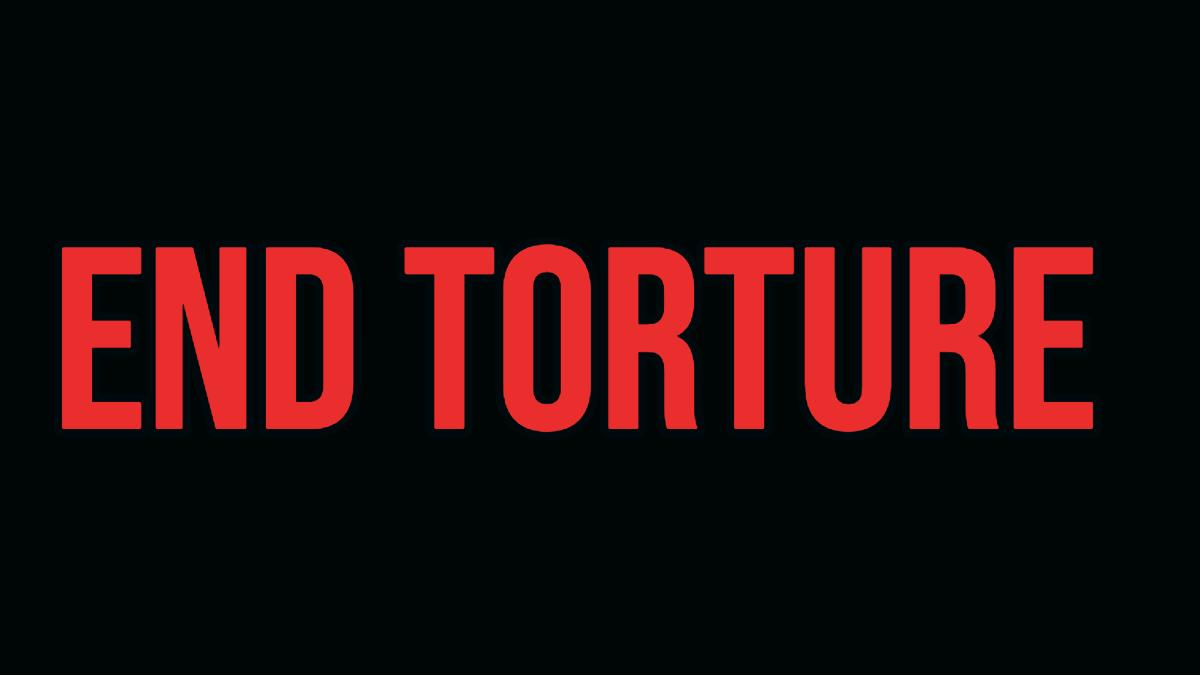By Veritas
Introduction
26th June was the International Day in Support of Torture Victims
Yet another 26th June has come and gone without Zimbabwe having adopted the United Nations Convention Against Torture and Other Cruel, Inhuman or Degrading Treatment or Punishment [CAT]. Previous Government undertakings and assurances given to the UN Human Rights Committee and to the UN High Commissioner for Human Rights as long ago as 2012 – see Constitution Watch 6/2017 [link] – have still not been fulfilled.
United Nations Secretary-General’s Message for 2019 International Day
UN Secretary-General António Guterres’ message to mark the 26th June this year was as follows:
The prohibition of torture is absolute — under all circumstances. Yet this core principle is undermined every day in detention centres, prisons, police stations, psychiatric institutions and elsewhere.
I am encouraged that we are moving towards universal ratification of the United Nations Convention against Torture, currently ratified by 166 States. Ensuring that national laws and practices are in line with the Convention is essential for moving the prohibition of torture from principle to practice.
Torture usually happens behind closed doors. It is therefore crucial for independent international and national human rights mechanisms to open those doors. The United Nations Subcommittee on Prevention of Torture does exactly that, visiting more than 100 prisons and other institutions and interviewing more than 1,000 detainees, officials, law enforcement personnel and medical staff every year, in close partnership with national preventive mechanisms.
In all our work, we must support victims and ensure respect for their right to rehabilitation and redress. This victim-centred approach guides the United Nations Voluntary Fund for the Victims of Torture, which assists nearly 50,000 victims of torture annually in some 80 countries. It has also helped us better understand different dimensions of torture, including the use of sexual and gender-based violence, and the specific assistance that different kinds of survivors of torture need.
Torture is a vicious attempt at breaking a person’s will. On this International Day in Support of Victims of Torture, I urge all States to end impunity for perpetrators and eradicate these reprehensible acts that defy our common humanity.
Zimbabwe Out of Step with The Movement to Universal CAT Ratification
The Secretary-General’s message notes a movement towards the universal ratification of CAT. Zimbabwe , regrettably, is not part of this movement, and we remain out of step with most of the rest of the world, of Africa and of SADC.
The current position can be summed up as follows:
· 166 of the 193 United Nations member states have adopted CAT and are State parties.
· Of the fifty-five African countries, only two – Tanzania and Zimbabwe have neither signed nor ratified CAT.
· Of the sixteen SADC countries, thirteen have adopted CAT and are State parties – these include all four of our immediate neighbours – Botswana [2000], Zambia [1998] , Mozambique [1999] and South Africa [1998]. Comoros, a SADC member since 2017, signed CAT in 2000 and ratified it in May 2017. Of the remaining three, Angola signed in 2013 but has not ratified. Only Zimbabwe and Tanzania have neither signed nor ratified.
In sharp contrast to the lack of movement in Zimbabwe our southern neighbour and fellow SADC member, South Africa – which signed CAT in 1993 and ratified it in 1998 – celebrated the day with the news that it has just enhanced its commitment to fight torture by ratifying OPCAT – the Optional Protocol to CAT. South Africa’s instrument of ratification of OPCAT was deposited at UN headquarters in New York on 20th June. [OPCAT adds another, more pro-active layer to the international framework against torture by emphasising prevention of torture by inspection of prisons and other places of detention as opposed to reacting to torture by prosecuting and punishing its perpetrators.]
Existing Constitutional Provisions and Criminal Law Inadequate
In Chapter 4, the Constitution of Zimbabwe provides that no person may be subjected to physical or psychological torture [section 53], that the right not to be tortured may not be limited by any law and that no person may violate the right [section 86(3)]. This makes the right an “absolute” or “non-derogable” right, the violation of which is never justifiable under any circumstances.
It is sometimes suggested that these constitutional provisions and our criminal law render it unnecessary to take further steps to punish and combat torture. Past experience and our history give the lie to that suggestion – Zimbabwe cannot claim that torture does not occur here.
The Constitution itself recognises that general statements are not enough – which is why section 11 lays down that “the State must take all practical measures to protect the fundamental rights and freedoms in Chapter 4 and promote their full realisation and fulfilment” [section 11]. Adopting CAT and implementing its provisions would go some way to complying with this constitutional obligation. To illustrate this, we end this bulletin by repeating passages from Constitution Watch 6/2017 issued to mark the International Day on 26th June 2017.
What is CAT?
CAT is a United Nations convention which requires States to take effective measures to prevent torture within their territories and prohibits them from transporting or extraditing people to any country where there is reason to believe they will be tortured. The text of CAT was adopted by consensus in the General Assembly of the UN on 10th December 1984. The Zimbabwean delegation was present, so presumably concurred in its adoption.
CAT came into operation on 26th June, 1987, when it was ratified by the 20th member State. Since then, the absolute prohibition against torture and other acts of cruel, inhuman, or degrading treatment or punishment has become accepted as a principle of customary international law [accepted by the international community as non-derogable right]. “Absolute” and “non-derogable” signify that—
· No exceptional circumstances whatsoever, whether a state of war or a threat of war, internal political instability or any other public emergency, may be invoked as a justification of torture
· An order from a superior officer or a public authority may not be invoked as a justification of torture.
What Does the Convention Do?
The purpose of CAT is to help combat torture and other forms of cruel, inhuman or degrading treatment throughout the world. Torture is defined very broadly to cover severe physical or mental pain or suffering inflicted by a public official, or inflicted with the consent or acquiescence of a public official, in order to obtain information from the person on whom it is inflicted or to punish, intimidate or coerce the person, or for a similar purpose.
CAT obliges States that are parties to the Convention to do far more than merely having a brief general prohibition of torture in their Constitution. It obliges States take all legislative, administrative, judicial and other measures to prevent acts of torture or cruel, inhuman or degrading treatment or punishment within their territories. These measures include:
· Criminalising torture as a standalone offence and providing appropriately serious punishments for it. Obedience to superior orders cannot be allowed as a defence.
· Ensuring that the State’s courts have jurisdiction to try crimes involving torture which are committed outside the country, if:
· the perpetrator or the victim is a national of the State, or
· the perpetrator is found in the State and is not being extradited to the country where the crime took place.
· Arresting suspected torturers and ensuring that they are brought to justice, either in the State where they have been arrested or in another State which has jurisdiction over them.
· Making crimes involving torture extraditable, i.e. ensuring that suspected perpetrators can be sent for trial in the countries where the crimes were committed.
· Refusing to extradite persons to any country if there are reasonable grounds to believe they may be tortured there.
· Assisting other States in the prosecution of perpetrators, for example by supplying evidence.
· Ensuring that military personnel, police officers and all other law enforcement agents are trained to be aware that all forms of torture, or cruel, inhuman or degrading treatment or punishment, are prohibited.
· Reviewing rules and regulations for the treatment and custody of arrested persons and prisoners, to ensure they prevent all forms of torture and cruel, inhuman or degrading treatments or punishments.
· Ensuring that victims of torture, or of any cruel, inhuman or degrading treatment or punishment, are able to lodge complaints and that their complaints are properly and promptly investigated by the appropriate authorities.
· Ensuring that victims of torture, or their dependants if they have died, obtain redress including compensation and rehabilitation.
· Prohibiting the use in court proceedings of statements extracted by torture.
States that are parties to CAT have to report every four years to the UN Committee Against Torture on the measures they have taken to implement the Convention. The committee is empowered to conduct confidential investigations into allegations that any member State systematically practises torture, and the committee may summarise the results of its investigations in its annual report. Member States may also allow the committee to receive and investigate allegations from individuals and other States that they are violating CAT.
Why Zimbabwe Should Accede to CAT?
· To flesh out our Constitution, which in section 53 prohibits physical and psychological torture and cruel, inhuman or degrading treatment or punishment,
· To show Zimbabwe accepts and takes seriously the universal norm that torture in all its forms is unacceptable.
· Although Zimbabwe is already a party to other international conventions that prohibit torture and cruel, inhuman or degrading treatment or punishment, in particular the Universal Declaration of Human Rights, the International Covenant on Civil and Political Rights and the African Charter on Human and Peoples’ Rights, the overwhelming majority of other States have considered it necessary to supplement their brief general prohibitions of torture with a specific and detailed treaty designed to ensure the elimination of torture in practice [i.e., CAT].
Conclusion
It is difficult to understand why the Government has not acceded to CAT under the new dispensation. The Government has much to gain from accession: it would show itself to be an integral member of the international community and ready to co-operate with other governments in upholding universally-accepted human rights. It would also demonstrate the Government’s willingness to implement the Constitution and to abide by commitments previously given to the UN Human Rights Council and its own citizens.






